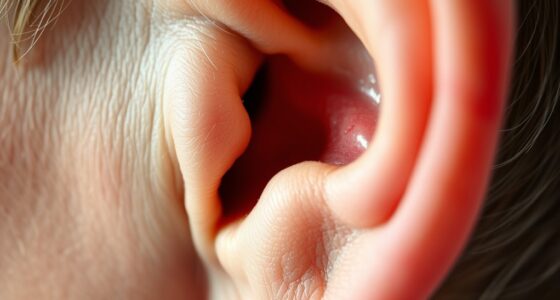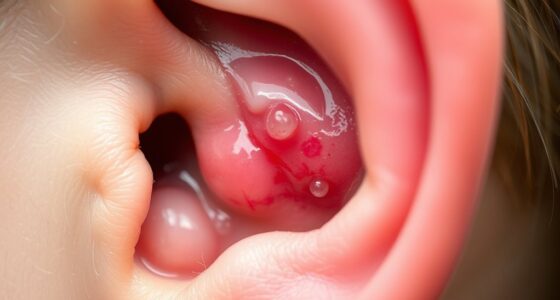Understanding the difference between auditory processing disorder (APD) and hearing loss helps explain why sounds might seem muffled or confusing even when your hearing test is normal. Hearing loss involves difficulty detecting sounds or needing louder volume, while APD affects how your brain interprets sounds after they’re detected. If you notice issues with understanding speech or localizing sounds, it’s important to know which condition you might have. Keep exploring to learn more about identifying and managing these conditions effectively.
Key Takeaways
- Hearing loss impacts sound detection; APD affects how the brain interprets sounds after they are heard.
- Individuals with APD often hear sounds but struggle to understand speech, especially in noisy environments.
- APD causes difficulty with sound localization and spatial awareness, unlike hearing loss which primarily reduces sound volume.
- Hearing aids help with hearing loss but do not address APD, which requires specialized auditory training and therapy.
- Accurate diagnosis distinguishes APD from hearing loss, guiding appropriate treatment and intervention strategies.

Many people confuse auditory processing disorder (APD) with hearing loss because both can affect how you perceive sound, but they are fundamentally different conditions. Hearing loss involves a problem with the ears’ ability to detect sound waves, meaning you might not hear certain sounds at all or need a louder volume to understand speech. In contrast, APD is a problem in how your brain processes auditory information once it’s received. You might hear sounds clearly, but your brain struggles to interpret or distinguish between them, especially in noisy environments.
APD affects how your brain processes sound, unlike hearing loss which impacts sound detection.
When it comes to speech recognition, people with APD often find it challenging to understand speech, particularly when multiple speakers are involved or background noise is present. This difficulty isn’t because they can’t hear the sounds but because their brain doesn’t efficiently decode what they’re hearing. For example, you might hear someone talking but have trouble catching specific words or following conversations. This is a common sign of APD, highlighting that the issue lies in processing rather than detection.
Sound localization is another area affected by APD. Sound localization refers to your ability to identify the direction and distance of a sound source. If you have APD, you might struggle to tell where sounds are coming from, making it difficult to navigate your environment or focus on a particular speaker in a group. This isn’t primarily due to hearing loss but because your brain isn’t accurately interpreting spatial cues from the auditory signals it receives.
Understanding the distinction between APD and hearing loss is essential because it influences how you approach treatment or management. Hearing aids, for example, can help with hearing loss by amplifying sounds, but they won’t necessarily improve auditory processing issues associated with APD. Conversely, therapy and training designed specifically for APD can help improve speech recognition skills and sound localization abilities, making it easier for you to understand speech in complex environments.
If you notice persistent difficulties with understanding speech or localizing sounds despite normal hearing tests, it’s worth exploring whether APD might be the cause. Recognizing these signs early can lead to targeted interventions that enhance your listening skills and overall communication. Additionally, understanding the underlying neural processing involved in APD can help guide effective treatment options and support strategies. Ultimately, knowing that APD affects how your brain processes sound, rather than how your ears detect it, empowers you to seek the right kind of support and improve your auditory experiences.
Frequently Asked Questions
Can Auditory Processing Disorder Be Diagnosed in Adults?
Yes, you can get an auditory processing disorder diagnosis as an adult. Central auditory testing helps professionals evaluate how your brain processes sounds. If you notice difficulties understanding speech, especially in noisy environments, seek an adult diagnosis. These assessments identify processing issues that may not have been apparent earlier. Early diagnosis allows you to explore strategies and treatments that improve your communication skills and quality of life.
Are Hearing Aids Effective for Auditory Processing Disorder?
Hearing aids are like a band-aid for auditory processing disorder—they help but don’t fix the root issue. They can improve sound clarity but aren’t specifically designed for APD. Assistive devices and specialized therapy approaches target the brain’s processing skills more effectively. If you’re considering options, consult a specialist who can recommend tailored strategies to help you hear and understand better, rather than relying solely on hearing aids.
What Are the Early Signs of Auditory Processing Issues in Children?
You might notice early signs of auditory processing issues in children through speech delays and language difficulties. If they struggle to follow directions, frequently ask for repetitions, or have trouble understanding conversations, it could indicate an underlying problem. Pay attention to how they process sounds and respond. Early identification helps address these challenges, ensuring they receive the support needed to improve communication skills and reduce frustration.
How Do Treatments Differ Between Auditory Processing Disorder and Hearing Loss?
Think of treatment like a tailored map—each path addresses different needs. For hearing loss, you might use hearing aids or cochlear implants to amplify sound. In contrast, auditory processing disorder often benefits from therapy approaches focused on improving listening skills, like auditory training. Assistive devices can help with hearing loss, but with APD, therapy targets how your brain interprets sounds, making each treatment uniquely suited to the condition.
Is Auditory Processing Disorder Hereditary or Caused by Environmental Factors?
You might wonder whether auditory processing disorder is hereditary or caused by environmental influences. It’s a mix of both; some individuals have a genetic predisposition, meaning it runs in families. Environmental factors, like exposure to loud noises or head injuries, can also contribute. While genetics play a role, you should consider environmental influences too, as they can impact how your auditory system develops and functions.
Conclusion
Now that you see the difference, remember that auditory processing disorder and hearing loss are like two different melodies in the symphony of your hearing health. While one affects how your brain interprets sounds, the other dims the volume altogether. Understanding these distinctions helps you seek the right help. So, don’t let confusion mute your awareness—shine a light on your hearing, and let clarity be your guiding note.










